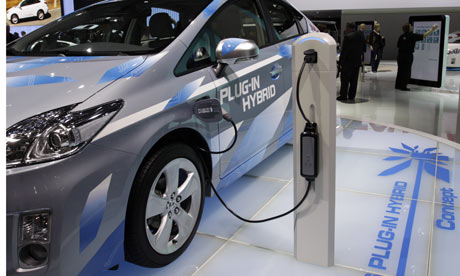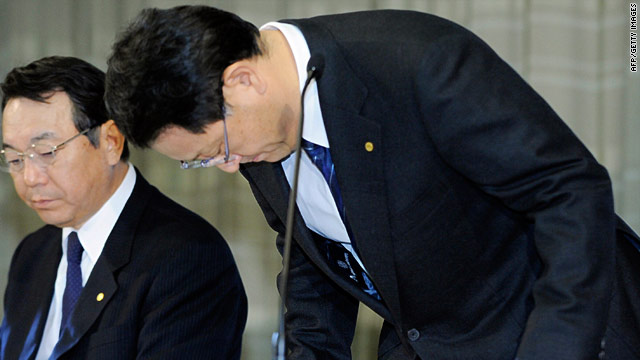Toyota Motor Corp’s president apologized extensively to the customers worldwide while he was announcing the recall of more than 400,000 highly expected hybrid cars. The automaker will repair their 2010 hybrid models, including the popular Prius, for problems in their anti-lock braking systems.
It is the third major recall since September and a further blow to the reputation of the world’s largest automaker. Toyota is already under fire for two other recalls covering more than 8 million vehicles worldwide due to problems with slipping floormats and sticky accelerator pedals.
It is also facing a potential rush of litigation for crashes linked to unintended acceleration blamed for 19 deaths and numerous injuries in the United States over the past decade.
The move comes amid complaints in Japan and the US over a brake defect that can cause temporary brake failure at low speeds, particularly on bumpy or slippery surfaces.
Reports today said 223,000 hybrid cars in Japan would be recalled, while an internal document obtained by Reuters said the recall would be extended to 436,000 cars worldwide. A global recall could affect almost 7,000 owners of the third-generation Prius in the UK.
“We do apologize for the inconvenience and concerns we’ve given to the customers,” President Akio Toyoda said in making the recall announcement from the automaker’s headquarters in Tokyo. “Quality is our lifeline for Toyota.”
The company will work to recover its customers’ trust, Toyoda said.
The automaker filed recall papers early Tuesday afternoon with the Ministry of Land, Infrastructure and Transport. Recall papers will be filed in the United States sometime Tuesday.
The recall adds to the woes of the beleaguered automaker, which had previously recalled more than 8 million cars in recent months. This latest recall was the first of Toyota vehicles sold in the domestic Japanese market.
The worldwide recall involves 437,000 vehicles, including the Toyota Prius and Sai, along with the Lexus HS250h. The Sai is sold primarily in Japan.
Sales of the Sai and Lexus HS250h will be halted until a fix is in place.
The Japanese automaker filed recall papers early Tuesday afternoon with the Ministry of Land, Infrastructure and Transport.
The announcement was made by Toyota President Akio Toyoda and Shinichi Sasaki, vice president of quality control, at the Toyota offices in Tokyo. U.S. officials will be notified of the recall on Tuesday morning.
Jim Lentz, president of Toyota Motor Sales in the United States, during an online video interview Monday evening, declined to say when — or if — Toyota would recall the car.
“We’re going to do whatever it takes to make sure our customers feel secure and safe with our products,” Lentz said of the Prius issue.
When the problem was originally brought to light last week, Toyota executives initially described it as a momentary delay in braking when the car was driving over slippery or bumpy surfaced such as ice or rutted roads.
Lentz, speaking about the problem on Digg.com Monday, described it as a change in braking feel, a description that Toyota has begun using more recently when talking about the issue.
The U.S. National Highway Traffic Safety Administration announced last week that it was opening a formal investigation into braking problems with the 2010 Prius. Nearly 125 Prius owners had lodged complaints about the problem. A spokeswoman for the highway safety agency said Monday that Toyota had not confirmed any recall plans.
Glitch fixed
Toyota has said it had fixed a software glitch in the anti-brake lock system (ABS) on the 2010 Prius at the end of last month, and that cars being produced now would not be subject to any recall. Owners of the latest, third-generation Prius have complained that on bumpy roads and on ice, the regenerative brakes which help charge the vehicles’ electric battery appear to slip and it lurches forward before the traditional brakes engage.
US automaker Ford Motor Co said last week it would roll out a software patch for consumers to address similar problems with braking on two of its hybrid models, without filing a recall.
Toyota’s hybrid recall is also likely to raise questions about the US safety authorities’ delay in investigating complaints over braking on the Prius.
The US National Highway Traffic Safety Administration (NHTSA) had received more than 100 complaints before opening a formal investigation on Feb. 3, a day after Toyota made its own announcement.
Shares in Toyota, which lost about a fifth of their value since late January, were up 3.8 percent, outperforming a 0.1 percent fall in the Nikkei average.
“The shares fell while Toyota appeared not to be doing anything to deal with its problems. But now, the fact that they’re taking concrete steps on the issue is being seen as positive,” said Hiroaki Osakabe, a fund manager at Chibagin Asset Management.
“But the gains will be limited since many investors want to see the impact of the problems on US car sales, with more share selling ahead if there’s a big drop.”
Lawsuits
In the apparent first of a potential rush of legal claims over the Prius, the owner of a 2010 Prius has sued Toyota in Los Angeles, claiming the automaker failed to fix a brake defect and seeking a court order requiring a recall.
Daniel Warshaw, a lawyer for Pearson, Simon, Warshaw & Penny LLP, said he believes his client is the first to file a suit seeking class-action status over the braking complaints on the Prius.
“I believe there will be many other lawsuits across the country in 72 hours,” he said.
Meanwhile, complaints to US safety regulators about 2010 Prius brake problems have jumped sharply since the Transportation Department announced a formal investigation last week.
Several complaint files total more than 1,000 reports from vehicle owners but a partial review of the documents submitted to NHTSA found some duplicates, so the exact number is unclear. Four injuries were reported.
More bad news came when KBB, or Kelley Blue Book, said on Monday it plans to cut US used-car values of recalled Toyotas by 1.5 percent “on concerns around the growing supply of unsold Toyotas on both dealer lots and at auctions.”
This came after KBB on Feb. 5 cut used-car values of recalled Toyotas by 1-3 percent. Used-car values are a key component in car dealers’ ability to set residual values — or how much a used car will be worth 36 months after purchase — and interest rates.
Toyota faces further scrutiny on Wednesday when its North America chief executive, Yoshimi Inaba, testifies to Congress in front of the House Oversight Committee in Washington.
Transportation Secretary LaHood and NHTSA Administration Administrator David Strickland will also testify.
In the wake of the recalls, Toyota’s share value has dropped about 20 percent.
Sources: CNN, Guardian, Yahoo!, Times of India





Thanks for wonderful information Before reading this blog I didn’t know that this activity is placed by Toyota. I am appreciate the blogger work which aware me about his activity.